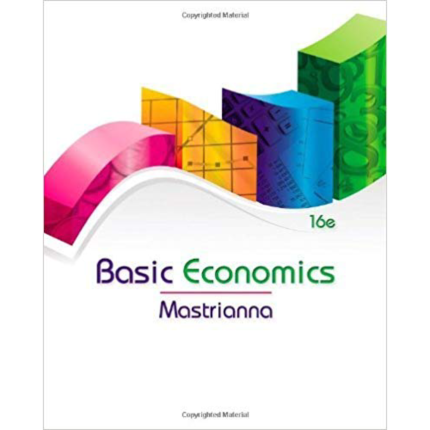Overview
Chapter 11
Gross Domestic Product
MULTIPLE CHOICE
1. Which of the following best describes gross domestic product (GDP)?
a. The market value of all inputs used to produce all final goods and services in a nation during a period of time.
b. The market value of all final goods and services produced in a nation during a period of time.
c. The quantity of all goods and services produced in a nation during a period of time.
d. The average price of all goods and serviced produced in a nation during a period of time.
ANS: B
PTS: 1 DIF: E TOP: Gross domestic product
TYP: RE
2. Which of the following is included in GDP?
a. The value of “free” household services provided by at-home spouses rather than a paid cook, maid, and baby sitter.
b. The value of unpaid-for volunteer time.
c. The unpaid-for services provided by the natural environment, such as breathable air.
d. Net exports: (value of exports value of imports).
ANS: D
PTS: 1 DIF: E TOP: Gross domestic product
TYP: RE
3. Which of the following spending is larger for U.S. GDP?
a. State and local government.
b. Federal government.
c. Net exports.
d. Change in business inventories.
ANS: A
PTS: 1 DIF: M TOP: Gross domestic product
TYP: RE
4. Gross domestic product is equal to the market value of all final goods and services:
a. exchanged during a period.
b. produced domestically during a period.
c. produced by the citizens of a nation during a period.
d. produced domestically during a period minus the depreciation of productive assets.
ANS: B
PTS: 1 DIF: M TOP: Gross domestic product
TYP: SA
5. Gross domestic product is the sum of the purchase price multiplied by the quantity of:
a. goods and services exchanged during the period.
b. final goods and services produced domestically during the period.
c. goods and services produced domestically during the period minus the depreciation of productive assets.
d. final goods and services plus intermediate goods produced domestically during the period.
ANS: B
PTS: 1 DIF: E TOP: Gross domestic product
TYP: SA
6. Which of the following is true?
a. GDP is a “flow” concept.
b. The purchase prices of both intermediate goods and final goods are included in GDP.
c. GDP measures economic welfare.
d. GDP is a measure of changes in the general level of prices.
ANS: A
PTS: 1 DIF: E TOP: Gross domestic product
TYP: SA
7. Which one of the following transactions would be included in GDP?
a. Ms. Kim pays $50 for a used picture frame at a neighborhood garage sale.
b. Mr. Doe donates $500 to his town’s junior college scholarship fund.
c. Ms. Bartolini pays $500 to fix the front end of her car damaged in a recent accident.
d. Ms. Smith pays $5,000 to purchase 100 shares of Microsoft stock.
ANS: C
PTS: 1 DIF: E TOP: Gross domestic product
TYP: SA
8. GDP is a measure of:
a. domestic production.
b. changes in the general level of prices.
c. material well-being.
d. social welfare.
ANS: A
PTS: 1 DIF: E TOP: Gross domestic product
TYP: RE
9. The GDP of a country can be derived by summing the:
a. expenditures on final goods and services produced domestically during the year.
b. payments to employees and owners of capital resources and then subtracting depreciation and indirect business taxes.
c. market value of all goods and services produced domestically during the period and then subtracting net exports from that figure.
d. income payments to the resource suppliers and net exports.
ANS: A
PTS: 1 DIF: M TOP: Gross domestic product
TYP: RE
10. Gross domestic product is officially measured by adding together the:
a. quantity of each good and service produced by U.S. residents.
b. market value of all final goods and services produced within the borders of a nation.
c. quantity of goods and services produced by companies owned by U.S. citizens.
d. none of the above.
ANS: B
PTS: 1 DIF: E TOP: Gross domestic product
TYP: RE













Reviews
There are no reviews yet.